 It’s not unusual to feel like you are running on limited energy during winter. You may feel tired and can’t quite explain the source. Chances are, you could be suffering from winter fatigue. This condition sets in during the wintertime and robs you of your energy. There are reasons that some people are more likely to experience fatigue during the winter season than in others, from reduced sunlight to low levels of vitamin D. However, with a few tips, you can beat the fatigue of winter and remain energetic throughout the season.
It’s not unusual to feel like you are running on limited energy during winter. You may feel tired and can’t quite explain the source. Chances are, you could be suffering from winter fatigue. This condition sets in during the wintertime and robs you of your energy. There are reasons that some people are more likely to experience fatigue during the winter season than in others, from reduced sunlight to low levels of vitamin D. However, with a few tips, you can beat the fatigue of winter and remain energetic throughout the season.
There are far fewer sunny days during the winter, which means that you will have less exposure to sunlight. Human biology and sunlight are closely connected, where the body’s melatonin production can become disrupted, affecting your circadian rhythm. The hormone melatonin is produced by the brain’s pineal gland, and it plays a key role in the sleep-wake cycle and mood. Darkness triggers the production of more melatonin.
As such, during the winter, when there is less sunlight, your body can produce an excess of melatonin, which can cause you to feel winter fatigue and tiredness. When your internal clock is affected by limited exposure to sunlight during the cold season, you naturally want to hibernate.
Exposure to sunlight plays a crucial role in vitamin D synthesis in the body. Individuals residing in northern states usually have a lower level of vitamin D, and this is amplified during the winter. The reason for this is that during the cold season, there is less sunlight and the days are short, which limits the opportunity to get outdoors. As a result, vitamin D synthesis is a challenge. Indeed, some places do not receive enough UV rays in the winter to enable vitamin D synthesis, even if you are outdoors.
This can negatively impact your body and mood, since vitamin D is critical to bone health, blood pressure, cell growth, immune function, and reducing inflammation. Additionally, low levels of vitamin D during the winter can lead to increased muscle weakness and feelings of winter fatigue.
Cold temperatures can affect individuals who are struggling with mood disturbances, such as sadness, depression, and anxiety, making their existing conditions even worse. In addition, the cold itself or seasonal changes can cause a type of depression referred to as seasonal affective disorder (SAD). It has symptoms such as fatigue, anxiety, tired feelings, sadness, lack of energy, and sleep disruption.
During winter, anxiety and sleep disruption, for instance, can worsen mood disorders and cause more fatigue to set in.
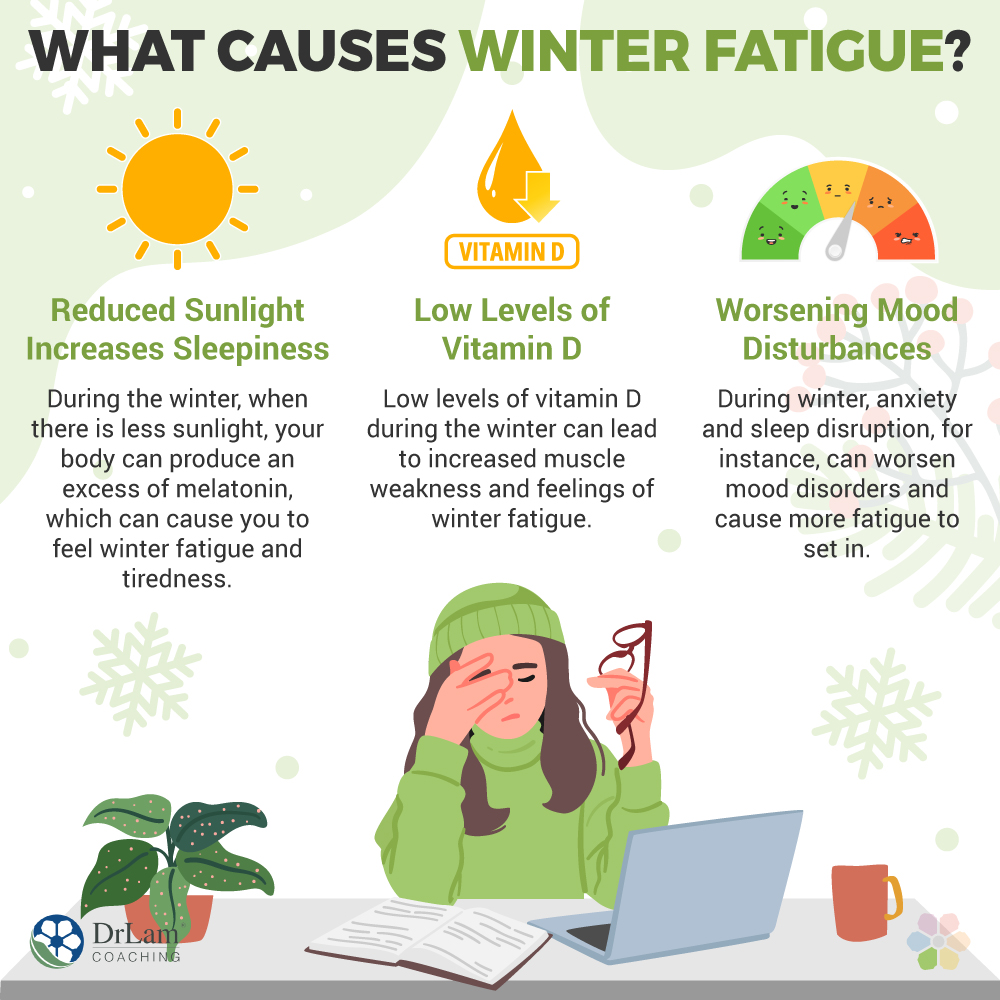
If you can get 30 minutes of sunlight exposure a day, you can boost your body’s vitamin D levels. When possible, aim to get some early morning sunlight, between 8 a.m. and 10 a.m. To increase your vitamin D levels, you can also take vitamin D supplements that can help boost your energy. The Institute of Medicine recommends that most adults take 600 International Units per day of vitamin D.
Additionally, you can also choose to increase your intake of vitamin D food sources. Opt for food options like eggs, mushrooms, fortified products like cereals and milk, and fatty fish, such as mackerel, salmon, and sardines.
 One sure way to restore your energy is with regular exercise activities. Just twenty to thirty minutes of exercise, four to five times a week is sufficient. You can choose activities that you enjoy, like walking, jogging, or hiking, for instance. A University of Georgia study found that adults who engaged in at least 20 minutes of low-to-moderate aerobic exercise three days a week experienced a boost in their overall energy levels.
One sure way to restore your energy is with regular exercise activities. Just twenty to thirty minutes of exercise, four to five times a week is sufficient. You can choose activities that you enjoy, like walking, jogging, or hiking, for instance. A University of Georgia study found that adults who engaged in at least 20 minutes of low-to-moderate aerobic exercise three days a week experienced a boost in their overall energy levels.
Exercise is effective at getting you energized during the winter because it keeps endorphins pumping in your body and fatigue at bay.
All work and no relaxation are a recipe for disaster. Winter is harsh and stressful on the body and mind. The physical, emotional, and mental toll that winter can have on your body can lead to fatigue. Pressure can build from traveling on the roadways, less exposure to sunlight, shorter days, mood and sleep disruptions, and just fighting the cold. During the wintertime, your body works harder to regulate its temperature and maintain balance.
Activities like meditation, yoga, reading, cooking, and just about any hobbies or activities that you enjoy can help you to relax and combat winter fatigue.
You can also fight winter fatigue by getting a body adjustment from your chiropractor. An adjustment helps to realign your spine and activates your nervous system. While your healthcare provider can work with you to realign your body in the office, he or she will likely give you some stretches and exercises that you can perform at home to help maintain alignment as well.
Whether it’s lamps or boxes, light therapy is another option that you can use to increase your energy levels. Since there is less sunlight during the winter, a light therapy box, for instance, mimics outdoor light and causes chemical changes in the brain. These changes will help to boost your mood and regulate your body’s circadian rhythms.
It can also be useful in positively impacting the neuroaffect circuit of NeuroEndoMetabolic (NEM) stress response by normalizing sleeping patterns. The effects of the chemical change can increase your energy and lift you out of winter fatigue.
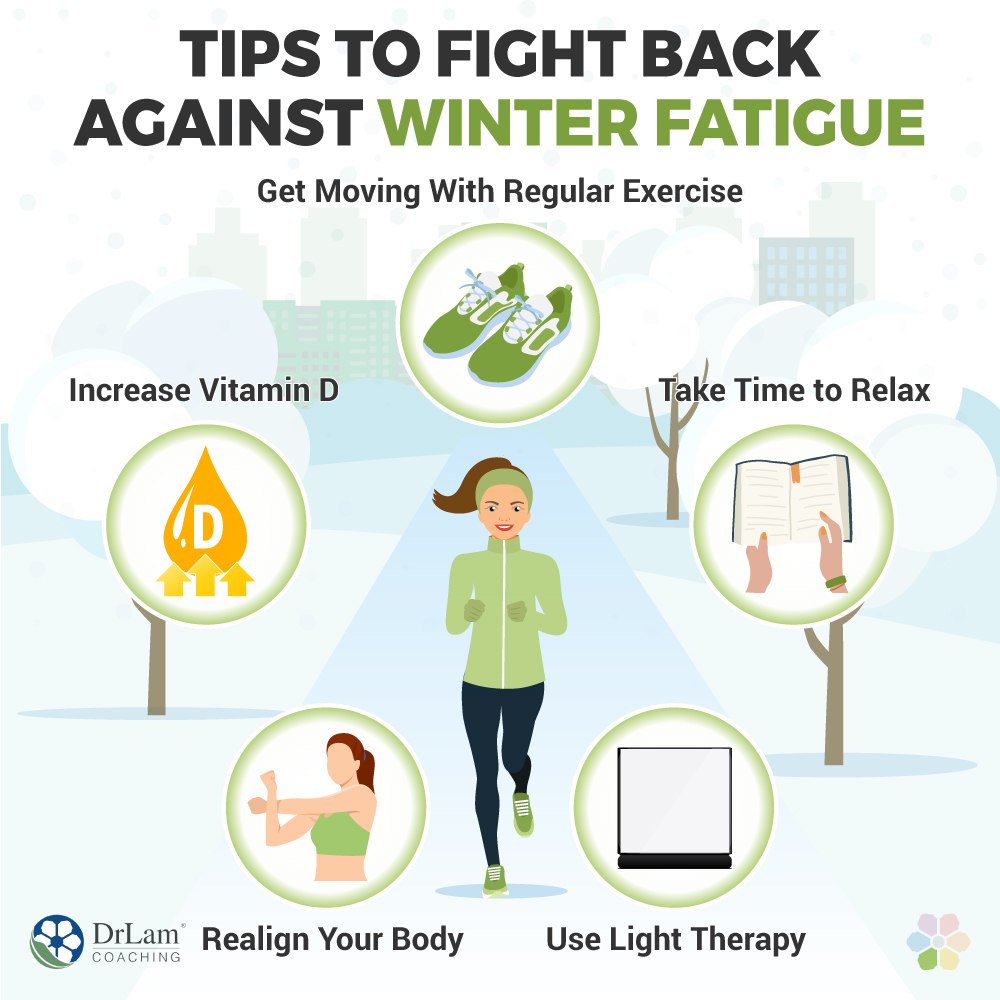
You can combat winter fatigue with a balanced diet. It’s tempting to eat comfort foods, carbohydrates, and sweets when winter ushers in the harsh cold, but maintaining a balanced diet during winter is key to help avoid fatigue. Make sure your diet consists of food like:
With a balanced diet, you’ll increase your energy as you fight off the cold and also keep cravings away.
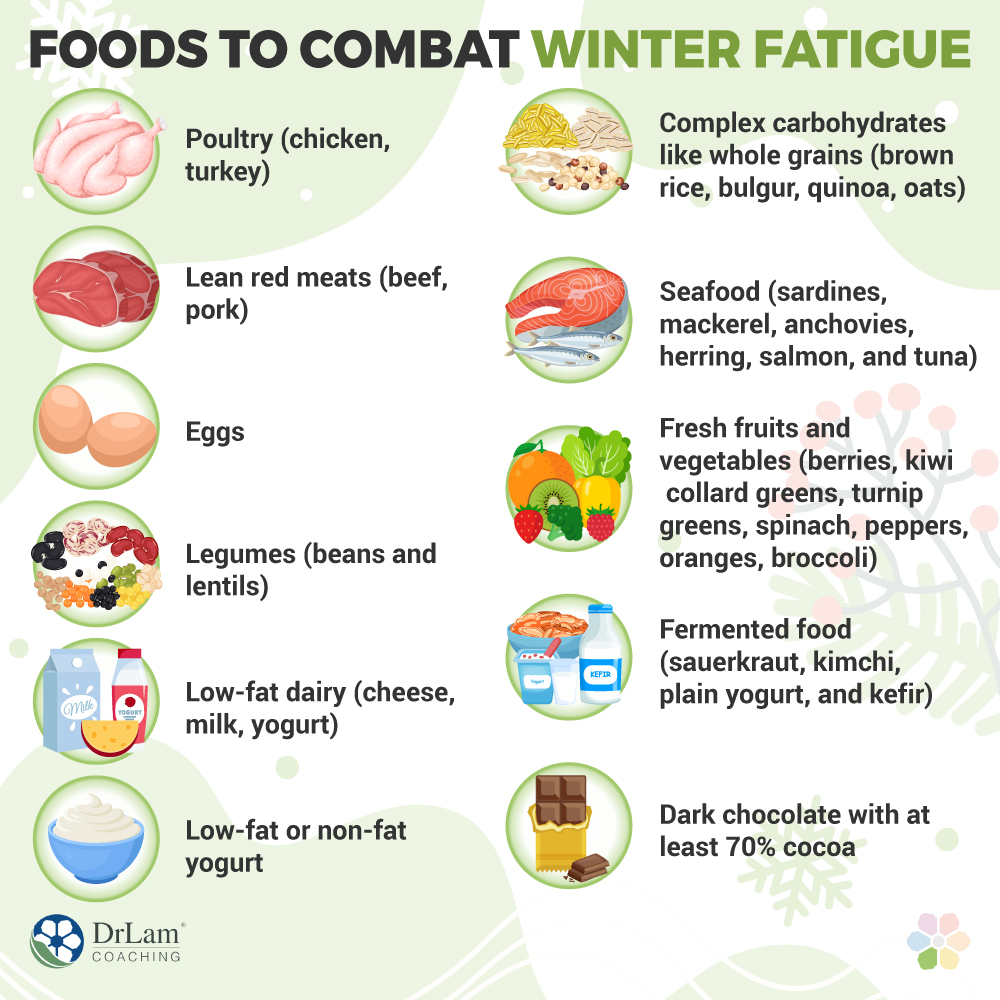
You can also supplement your diet with certain vitamins to help alleviate feelings of fatigue.
 Vitamin B12 can improve your mood and alleviate winter fatigue. It plays a key role in the metabolism of cells in the body and is important for energy production. Vitamin B12 also supports the release of energy that helps to alleviate fatigue during the cold season. You need an adequate level of vitamin B12 in your body to keep up with the production of red blood cells. This prevents anemia, a condition that has symptoms such as feelings of weakness, tiredness, and exhaustion. Adults between 19 and 64 years of age need 1.5 micrograms of vitamin B12 daily to support optimal health.
Vitamin B12 can improve your mood and alleviate winter fatigue. It plays a key role in the metabolism of cells in the body and is important for energy production. Vitamin B12 also supports the release of energy that helps to alleviate fatigue during the cold season. You need an adequate level of vitamin B12 in your body to keep up with the production of red blood cells. This prevents anemia, a condition that has symptoms such as feelings of weakness, tiredness, and exhaustion. Adults between 19 and 64 years of age need 1.5 micrograms of vitamin B12 daily to support optimal health.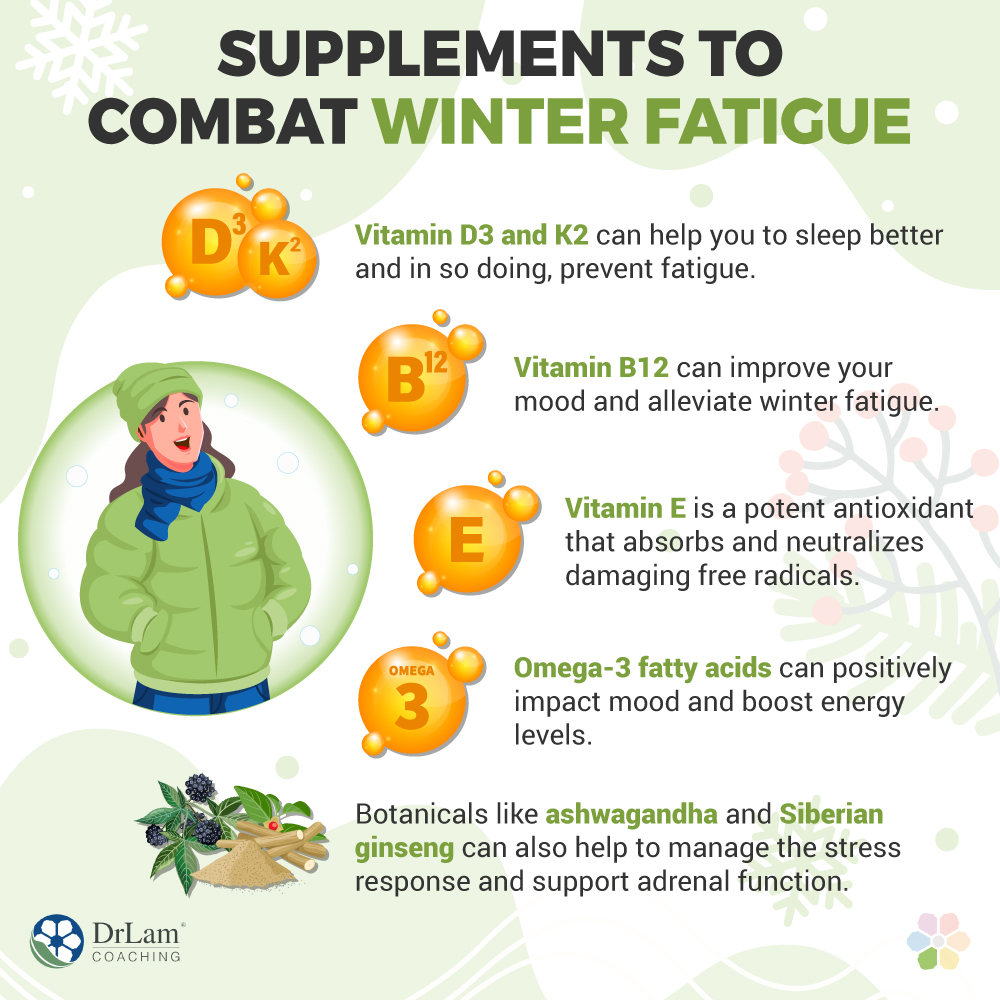
A bitterly cold and snowy winter season can make it difficult for some individuals to adapt to the added stressors it places on their bodies. The adrenals (stress glands) work harder than normal because of seasonal changes. As a result, this could add to chronic stress and ultimately result in adrenal exhaustion or adrenal fatigue.
Adrenal fatigue syndrome (AFS), a neuroendocrine disorder that is caused by chronic stress, can disrupt your sleep cycle and cause symptoms such as insomnia, fatigue, and temperature intolerance, among other symptoms. Chronic stress from AFS activates the Cardionomic circuit, which includes the adrenal glands, the autonomic nervous system (ANS), and the cardiovascular system (CVS).
AFS places excess stress on the body and the various bodily systems. The NeuroEndoMetabolic (NEM) Stress Response works to alleviate stress. However, prolonged stress prevents the adrenal glands from working efficiently.
Winter has the potential to cause worsening AFS symptoms by elevating the level of stress that an individual experiences.
Winter fatigue can have you feeling drained during the cold season. This can disrupt your work life, home life, and social life. If you think that fatigue is keeping you down, speak to your doctor. Getting a proper assessment of your condition at your healthcare provider’s office can help you remedy the issue.
If you are concerned about winter fatigue and would like assistance in determining natural ways to restore your adrenal health, the team at Dr. Lam Coaching can help. We offer a free** no-obligation phone consultation at +1 (626) 571-1234 where we will privately discuss your symptoms and various options. You can also send us a question through our Ask The Doctor system by clicking here.
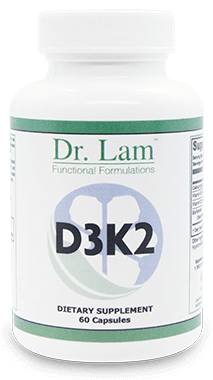
Vitamin D3 and Vitamin K2 to help fight winter blues
Winter fatigue is a seasonal condition that can be caused by a few different factors, such as limited sunlight exposure, a drop in vitamin D levels, and mood disturbances. You can remain energized during the winter season by exercising regularly, eating a balanced diet, using light therapy, vitamin supplementation, and finding the time to relax.